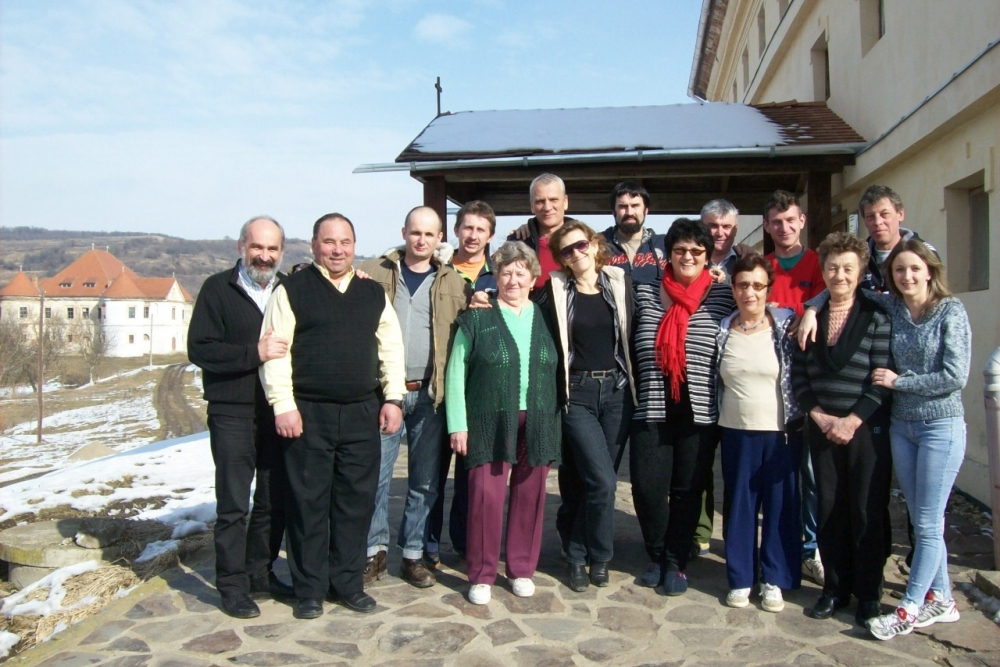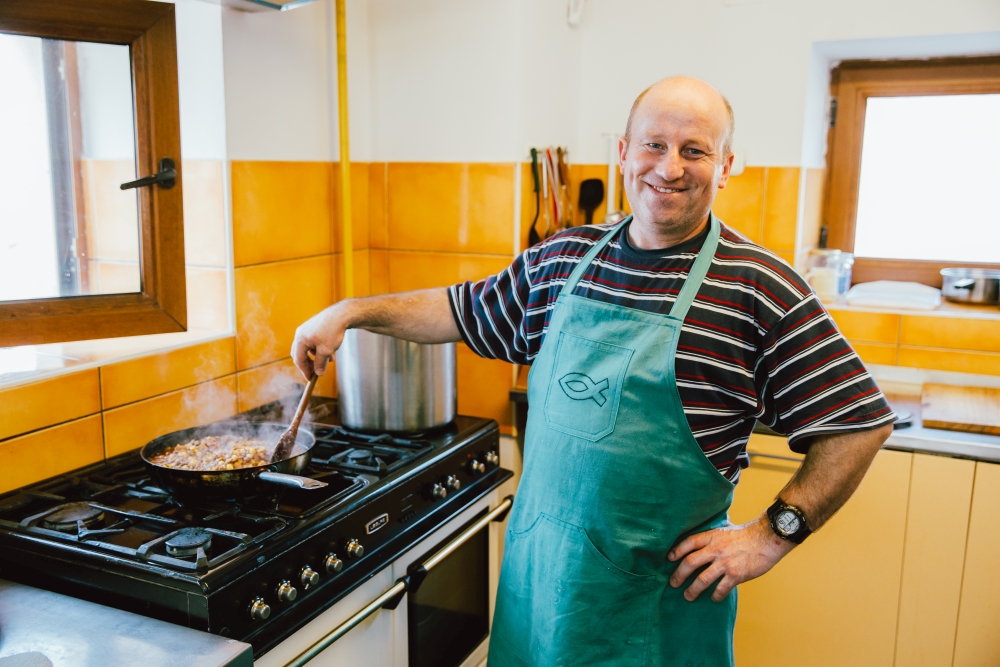What do we offer?
The purpose of the therapy is to provide meaningful help to addicts and their affected relatives in the context of lasting relationship.
Our basic therapies are comprised of our Long-Term and Short-Term Therapy Programs. Therapy can be supplemented by the local support groups and participation in individual counseling.
Category: Therapy
Target Group: Adult addicts and their families
Duration: 4 days
Location: Therapy Center, Ozd
Frequency: 4 times/year
Scope:
Initiating abstinence, obtaining information about addictions, establishing a diagnosis (addiction, co-dependence), defining a therapeutic plan, increasing self-knowledge.
The program consists of:
Group activities, workshops, personal counseling, Bible lectures.
Participation Requirements:
Rolling into the program is conditioned by a preliminary interview, which requires personal presence.
Description:
From 2021, our foundation will organize 4-day therapeutic programs for male and female addicts and their relatives. The program facilitates self-knowledge and confrontation with addiction through group sessions. The workshops provide information on addiction and co-dependence, as well as assistance in defining a diagnosis and preparing a therapeutic plan. Bible lectures create the opportunity to form and deepen a relationship with God. Witnessing the life stories of recovering addicts can greatly increase the inspiration and motivation of participants for recovery.


Category: Therapy
Target Group: Adult addicts and their families
Duration: 12 days
Location: Varying
Frequency: 4 times/year
Scope:
Creating the basis of abstinence, treating codependency within the family unit and encountering the Christian faith.
The program consists of:
Medical and psychological lectures, workshops, small group discussions, individual counseling, Bible reading, preaching, excursions, sports.
Participation Requirements:
Must attend voluntarily, be motivated to engage in therapy, commitment to abstain from addictive substances during the therapy. Acceptance into the program is based on a preliminary interview.
Description:
Bonus Pastor Foundation has been organizing Short-Term Therapy programs since 1996 for both men and women, for addicts and their families. The program is strongly recommended for people who are looking for help with their co-dependency, as well. Short-Term Therapy programs are organized three times a year and provide a good opportunity to learn about the addictive illness, to recognize the problems and misconceptions associated with it, to increase the ability and motivation to change.
” I knew that most of my troubles were related to excessive drinking, but it was only when I attended a Short-Term Therapy that I really understood what dependency was. It was extremely hard for me than to admit that I am an alcoholic.”(Sándor)


Category: Therapy
Target Group: Adult addicts (men)
Duration: 6-9 months
Location: Therapy Center, Ózd
Frequency: Continuous
Scope:
The implementation and exercise of abstinence, positive character building (effective behavioral patterns, new values, acquiring and practicing life skills)
The program consists of:
Individual spiritual care, group therapy, work therapy, devotions, sports, excursions
Participation Requirements:
Must attend voluntarily, be motivated to engage in therapy, commitment to abstain from addictive substances during the therapy. Acceptance into the program is based on a preliminary interview. We require a bill of health certificate and analysis for hepatitis, TBC, and a fecal examination.
Description:
The Long-Term Therapy program began at the Ózd Therapy Center in 2005 and is based on the Portage Therapy Model which originated in Canada. The Long-Term Therapy approaches recovery from addiction by immersing the addict in a therapeutic community which exhibits group therapy.
There are two important principles in the homely atmosphere of the Therapy Center: self-help and positive feedback from the group. All aspects of the program are therapeutic, whether they are group meetings, individual counseling, psychological counseling, work or leisure activities. The aim of the therapy is to develop a positive personality that is indispensable to a healthy way of life (initiative, decision-making, responsibility, problem solving, communication skills and relational wisdom).
The therapy offered to adult men is a lifelong investment: it does not offer escape from the problems of life, but is preparing the former addict to live life in the real world. Peter, a former resident of the Therapy Center, says: “Life is stressful, but without alcohol it can be lovely also. Ózd does not give you a recipe for this. But it will help you to carry out an intense personal inventory and cleaning, and after you have thrown away a lot of dust and dirt, inside of yourself you will get something worth holding onto. “


Category: Aftercare, Therapy
Target Group: Addicts, recovering addicts, relatives of addicts
Duration: 1-2 hours
Location: At a Bonus Pastor Office / via Skype
Frequency: On request
Scope:
develop motivation for reaching and/or maintaining abstinence, improve the quality of life, learn about addiction, recover from codependency
The program consists of:
Psychological Counseling, psychotherapy, family therapy
Participation Requirements:
Must attend voluntarily, be motivated to engage in therapy.
Description:
We provide individual counseling to those who are looking for rescue and recovery from addictions or other personal or family problems related to the addicted lifestyle. We base the individual counseling on a care plan set up together with the person requesting help.
The place of personal conversation is usually in our offices, but can also be made on request for family visits, hospitals or via Skype.
Category: Aftercare, Therapy
Target Group: Addicts, recovering addicts, family members of addicts
Duration: 1-2 hours
Location: 11 Transylvanian cities
Frequency: Weekly / biweekly
Scope:
Maintaining and strengthening abstinence, managing co-dependence
The program consists of:
Focused (problem-orientated) conversations, Bible study, leisure programs
Participation Requirements:
Abstinence from addictive substances during group meetings.
Description:
The primary aim of support groups functioning in 11 cities across Transylvania is to reinforce the abstinent lifestyle for those who have participated in some of our therapy programs. Next to this, the groups also offer a great opportunity to get involved with those who are looking for help.
They offered for me to enroll in a long-term therapy program. But I did not take that. Rather, I chose to go to the support group. The first group meetings were a help to me in discovering God’s care: the Good Shepherd came to me to find his hundredth sheep. This is where I learned what it means to be valued by someone. “ , says Laci after eight months of abstinence.
One of the main characteristics of a support group is an honest, intimate atmosphere, where everyone has the opportunity to benefit from the group just as much as they put in.
We are always encouraging the initiation of additional groups in further locations, as well.
Category: Therapy
Target Group: adult family members of addicts
Duration: a weekend
Location: varying, mostly at the Therapy Center
Frequency: twice a year
Scope:
treating codependency within the family unit and encountering the Christian faith.
The program consists of:
lectures, workshops, small group discussions, personal counseling and mentoring, biblical lectures, excursions.
Participation Requirements:
must attend voluntarily, be motivated to engage in change.
Description:
The Bonus Pastor Foundation has been organizing conferences for relatives of addicts since 2018. Participation in this program is highly recommended to those seeking help as a family member of a person affected by addictions. The twice-yearly conference provides a good opportunity to identify the nature of co-dependence, to recognize misconceptions and related problems, and to increase readiness and motivation to change.
